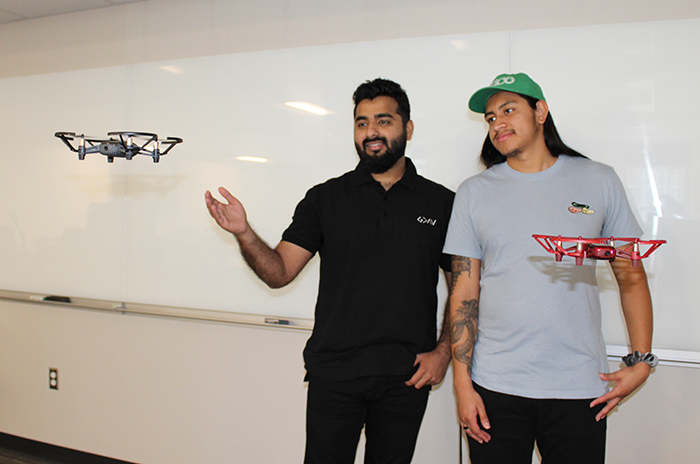Computer Science
Ask AI: A look at artificial intelligence and its impact at Tech

(From Eagle Drive magazine, December 2023)
Can machines think? Pioneering computer scientist Alan Turing posed this question
in 1950, and the concept continues to captivate students and researchers of artificial
intelligence and machine learning.
Now AI can answer the question for itself:
“Machines, like computers, can process and analyze data, make decisions based on programmed
algorithms and perform complex tasks, but they don’t ‘think’ in the way humans do.”
– ChatGPT
ChatGPT, a language model developed by Open AI, also “explained” that machines can
simulate human-like behavior and intelligence, but they “lack emotions, self-awareness
and true understanding, which are essential aspects of human thinking and consciousness.”
The tool has quickly become a common way for people to interact with AI in the 2020s.
Users download the application on their smartphone or computer, enter questions or
information requests and receive human-like responses. The “GPT” stands for generative
pre-trained transformer.
ChatGPT also has uses in academia. At Tennessee Tech, computer science professor Doug
Talbert, Ph.D., said it can be a problem-solving tool. For example, when his research
students have questions about coding and debugging, he may encourage them to try it.
“Maybe it gives them a starting point on how to think about it,” he said. “They would
be googling it anyway… so why not ask ChatGPT?”
As artificial intelligence continues getting “smarter,” faculty and students alike
are considering the opportunities, applications and implications.
Department of Computer Science Chair Gerald Gannod, Ph.D., said students face a future
where GPT-based software development tools will be the norm.
“As such, we need to provide instruction on how to best employ these tools in everyday
software engineering,” he said. “Moreso than any other major, computer scientists
have the responsibility to know how to use tools like ChatGPT effectively while still
leading the way in creating new technologies that impact our industries and communities.”
One way he addressed the innovation was offering a special topics course in the summer
of 2023 called “Software Engineering with ChatGPT” in which students explored benefits
and challenges related to using an AI assistant to create software.
“They were able to gain a deeper understanding of why the concepts they learn in our
courses – especially algorithm design, test-driven development and software development
– are a necessary foundation for fully understanding how to reap the maximum benefit
of using GPT-based software engineering assistants,” he said.
ChatGPT has also caused faculty to consider a crucial question: When is it acceptable
to allow students to use generative AI in a course?
“We recognize that the technology has the potential to transform our discipline and
what we can expect students and graduates of our program to be able to do both while
in school and when they move forward in their careers,” Gannod said. “As such, we
have to up our game by modifying how we assess student work. This includes making
sure we are testing student knowledge that is beyond the capability of what an AI
can produce.”
Talbert and fellow computer science professor William Eberle, Ph.D., agreed that it’s
vital to incorporate the tool into computer science education.
“If students don’t know how to use it to be more productive more quickly, they’re
going to be at a disadvantage in the marketplace,” Talbert said.
Eberle added, “You can look at it as making life easier. If it can start a process
that would have taken longer to figure out – and do it well enough – you can do more
things faster.”
But students are also faced with an ethical challenge – avoiding AI when instructed
not to use it.
“Without foundational knowledge of software development, students will be unprepared
to step into the workplace,” Gannod said. “A cultural change is needed that emphasizes
intrinsic-driven learning (wanting to learn) rather than externally motivated learning
(driven by grades).”
With rapid advances in the field of AI, students are discovering that it’s an exciting
time to be a computer science major. For example, Tech’s Association for Computing
Machinery student chapter presented an artificial intelligence and machine learning
demonstration to inspire fellow students. Brett Billingsley, club president, talked
about how AI and ML are used in the real world and offered resources, while Garrett
Hayes, vice president, demonstrated a facial recognition program he created.
Students are also gaining AI experience through research opportunities alongside professors
like Muhammad Ismail, Ph.D., who serves as principal investigator of numerous grants
from the National Science Foundation and Qatar Foundation and leads NSF’s CyberCorps
Scholarship for Service grant program at Tech.
Ph.D. candidate Umair Mughal has been working with Ismail on a project to defend drones
against cyberattacks.
“Hackers can attack the autopilot system, so we are developing intrusion detection
systems using machine learning techniques,” he said. “We launch cyberattacks on our
testbed that consist of drones and hacking tools. Then we collect benign and malicious
datasets and develop AI-based intrusion detection systems.”
Some of Ismail’s other projects include researching the development of AI-based strategies
for intrusion detection in cyber-physical critical infrastructure as well as the operation
of 5G and beyond wireless networks.
AI research and learning opportunities will continue to grow beyond Bruner and Prescott
halls (which house most computer science classrooms) with Tech’s new MInDS (Machine
Intelligence and Data Science) center and Ashraf Islam Engineering Building, the university’s
first smart building, which will house the Cybersecurity Education, Research and Outreach
Center when complete in 2024.
It’s a lot to think about – even for a machine.
Lean More About Our Programs

